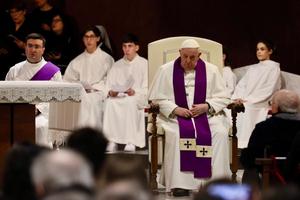Peter Kreeft: St. Augustine ‘Is a Man for Our Times’
Philosophy professor outlines saint’s burning heart and classic, Confessions.

Philosopher Peter Kreeft has published 75 books on the Catholic faith. In his writing and his teaching (he is a professor at Boston College), he often revisits the works of classic philosophers and thinkers, such as Socrates, St. Thomas Aquinas, St. Augustine and C.S. Lewis, introducing their inexorable logic to a new generation.
In I Burned for Your Peace: Augustine’s Confessions Unpacked, Kreeft explores timeless questions and leads his readers into a deeper understanding of the saint and his God.
Kreeft spoke recently with the Register about his most recent work, which looks at some of the “big ideas” found in the fifth-century writing of St. Augustine of Hippo.
There are so many vital works from Catholic intellectuals throughout the ages — from St. Thomas Aquinas to St. John of the Cross and St. John Paul II. Why do you consider Augustine’s Confessions the most beloved book in the world next to the Bible?
Well, first of all, polls support that. Augustine’s Confessions has been the single most read, reread and quoted post-biblical Christian book ever written. But, secondly, the reason the book is held in such high esteem is Augustine himself.
Historically, Augustine has probably influenced Christians more than anyone else outside of the Bible. Psychologically, he is a complete, compound and compassionate human being. He combines a compassionate heart and a great mind — and he’s a saint! He used the burning light (his mind) and his heart to get through to God. Augustine shows us the errors and truth — the byways, not just the main ways.
I would say that Augustine’s Confessions is actually the single most compelling and attractive and fascinating book ever written by a saint. It is, to the books of the saints, what A Man for All Seasons is to movies about saints — it’s No. 1. And that’s mainly because of the incredible conversation between brilliant thought and genuine love and passion, agony as well as ecstasy. His heart and his head are both at work.
What is the chief reason for Augustine’s broad appeal? Why does his message resonate with both Protestants and Catholics, with both men and women?
He’s a mirror. In reading Augustine’s story, we recognize ourselves. He shows us who we are or who we can be — our heads and our hearts; our sins and our virtues; our darkness and our light; our mistakes and our truth. He asks the questions that everyone asks: “How can I possibly conceive God? How can I find him?”
Augustine was one of the most prolific writers in the history of Christianity. Why do you consider his Confessions his most important work?
It’s important because it attracts people to a life of sanctity. It’s important because it has helped to shape the public history of Western Civilization — although for that, it’s not as important as City of God, which almost singlehandedly created the Middle Ages. But City of God is about 1,000 pages, so Confessions — with just over 300 pages — is much more accessible.
There are many nuggets or truths offered by Augustine in Confessions. Is there a single message that stands above all the others?
If you could state the theme in a single sentence, it would be the sentence on the first page of Confessions, which has been quoted more than any other: “Thou hast made us for thyself, O Lord, and our heart is restless until it finds its rest in thee.”
Is that message — as profound and as universal as it may be — becoming less and less relevant in a world that seems to focus more each day on itself and less on God?
No, I think exactly the opposite is true: The more lost you are, the more relevant is a road map. So Augustine is a man for our times — not only because he shows us the twistings and turnings of the dark and crooked mind, but because he shows us the way out of sin and debauchery: the way back to God. Augustine is also extremely relevant in the modern world because he was a sex addict [before his conversion].
Augustine knew what it was like to push God away — to hold him at bay — while he experienced the attractions of the world. The danger inherent in this is that one may fall too much in love with the world and never know the joy of falling in love with God. What would Augustine say to those today who have fallen too much in love with this world?
The first thing he’d say is: “Be totally honest.” Experience — even the experience of sin — is a teacher. The world promises what it can’t deliver. What it promises is freedom, and what it delivers is addiction and slavery. Whether we’re talking about pride or lust or greed or any of the sins, they’re all addictive.
A recent CARA study reveals that children as young as 10 years old are leaving the faith, being drawn into the secular culture. The 500th anniversary of the Reformation is being celebrated around the world. Given that, may I ask you to reflect on your own conversion?
Well, first, I don’t buy that [about children being drawn into the culture]. What I mean is that the facts are there — children and adults are really being drawn away from their faith — but the explanation is wrong. The so-called “war” between science and religion is a fake war, which has absolutely no casualties. There is no study in the Christian world that supports that hypothesis. The real reason that people leave the faith is personal.
As for my own conversion story, I was motivated by facts, by truth. As an undergraduate at Calvin College, I read the Early Church Fathers. My goal had been to persuade myself that I was in the right church; but the continuity, the historical case, the seamless web of Catholic doctrine was overwhelming.
The best professor I had during my years at Calvin College taught philosophy. We became good friends, and I confided to him that I was thinking of becoming a Catholic. It turned out that he had almost converted when he was my age; and he was most sympathetic.
You point out that what Augustine confesses is, most fundamentally, God and his grandeur, not just himself and his badness. Isn’t Christianity’s journey a metaphor for the Christian pilgrimage from love of self to love of God, from the city of the world to the city of God?
Yes. What attracts most people to Augustine is the hope of redemption from a life of despair to a life of meaning. He’s not just conventionally confessing his faith in God; the reader senses that he’s truly standing in the presence of that God.
There’s a line in which Augustine says, “Don’t leave — read this book! Have your ear to my heart.” His heart is absolutely, fanatically in love with God. Augustine is like Job: His wildness gets him into a lot of suffering, but his restless heart — that famous line — is the key to the story. He doesn’t give up. He doesn’t substitute a smartphone for a real encounter with God.
You offer a template for the reading and appreciation of your book — one that encourages individual thought and consideration on the part of the reader. Have you used this template effectively in any other venue? In a class, perhaps?
Definitely. I’m a bridge builder because great books are written for ordinary people, despite our obstacles. If you can get in dialogue — Augustine is in dialogue with God — it’s an exciting thing, to read this book. Confessions is not just a research tool full of dusty old facts; you encounter a real person.
What is your next project? What can we look forward to in the months and years ahead?
Well, first let me also recommend a movie on Augustine put out by Ignatius Press, called Restless Heart. I’m skeptical of most religious movies, but this is truly excellent.
I’ve got a book coming out from Ignatius Press: Ecumenical Pensees: How Protestants and Catholics Can Learn from Each Other Without Compromising.
And at long last, a four-volume History of World Philosophy will be coming out, published by St. Augustine Press.
What question have I not asked that you would like to answer? What would you like to say about Augustine that you would like everyone to hear?
One thing I can tell you about my conversion that differs from some people’s experience: Typically, when Jews convert to Christianity, they’ll describe themselves as “completed Jews.” But when I converted, I didn’t become any less evangelical, but more.
When Augustine is depicted in art, he is always shown with a heart on fire in one hand and a Bible in the other. That image aptly describes the urgency of his search for God.
But, most importantly, read Augustine’s book. You’ll fall in love with him; he will change your life.
Kathy Schiffer writes
from Southfield, Michigan.
- Keywords:
- confessions
- kathy schiffer
- peter kreeft
- st. augustine

















